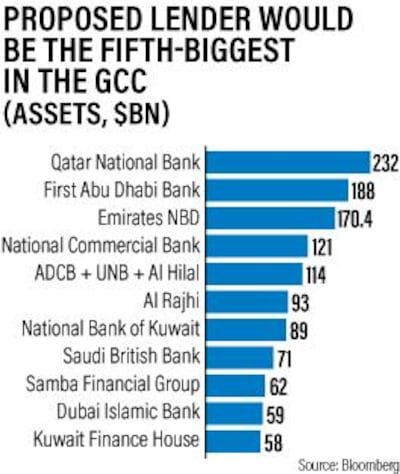The next bank merger in the UAE could see a tie-up between Abu Dhabi Commercial Bank, Union National Bank and Al Hilal Bank.
While analysts have said the move would be a boon for the corporate sector, what about consumers?
Ambareen Musa, the founder and chief executive of the UAE financial comparison website Souqalmal.com, says you may be giving up branch proximity in exchange for improved product offering, better customer service or a smoother digital banking experience.
News that ADCB, the second largest lender in the capital, is exploring the possibility of a merger with rival UNB and Sharia-compliant lender Al Hilal Bank, came at the start of this month.
The tie-up, which may happen within weeks, according to media reports, could create the Arabian Gulf's fifth-largest banking entity with about $114 billion (Dh418bn) in combined assets.
Tarek Fadlallah, the chief executive of Japanese money manager Nomura Asset Management Middle East, says a bank multiplied by the power of three leads to a greater ability to invest in expensive IT systems.
“From that perspective you would expect the offering of the new bank to be significantly enhanced and that should lead to greater efficiencies and lower costs that can potentially be passed on to consumers,” he says.
However, Mr Fadlallah says the merger will also leave consumers with fewer options.
“You could argue there was too much competition with about 50 licensed banks in the UAE for a relatively limited population. That’s always been the problem and clearly there is a necessity for consolidation, but the fact you have fewer banks means less choice.”
Bank mergers can also lead to some customers switching to other banks. According to the 2017 Retail Banking Satisfaction Study by the global marketing firm JD Power, 46 per cent of respondents whose bank went through a merger within the previous 12 months reported they would definitely switch banks.
But among retail banking customers whose banks merged one to three years prior to the survey, only 29 per cent said they would move on.
An older study by the Deloitte Centre for Banking Solutions found that of those who did move to another lender, a surprising 36 per cent said they did so for emotional reasons. This is perfectly understandable, says Ms Musa.
“When a merger is announced, customers often end up feeling confused, not knowing what to expect. Service disruption or deterioration, potential fee increases and closure of bank branches are the concerns that are most likely to bother them,” she says.
“Customers may also be left wondering: will the bank retain their favourite product? Will their go-to branch employee still be around?”
Ms Musa says that while a bank’s existing agreements with customers mean that their active loans and deposits will not be negatively affected by interest rate and fee changes, customers left in the dark are most likely to assume the worst.
“It is in the best interest of merging banks to reassure customers and maintain open and personalised communication with them,” she says.
“Without regular communication customers may feel alienated, which could prompt them to take their money elsewhere.”
Any customers that do find a favourite credit card or deposit product has been discontinued, should speak to a bank representative, advises Ms Musa.
“They may be able to offer you a similar product best suited to your requirements, and it’s also likely that you may walk away with a great deal or discount.”
__________
Read more:
Abu Dhabi's ADCB in merger talks with UNB and Al Hilal Bank
UNB shares climb for a second day on Abu Dhabi bank merger announcement
UAE consumers shortchanged by credit shield cover
Listen:
Business Extra podcast: ADCB merger would shake up banking sector
__________
Jonathan Rawling, the chief financial officer of UAE financial comparison site yallacompare, says the key objective of merging two or more financial institutions is to realise economies of scale by needing less infrastructure for a larger customer base.
“Therefore, customer retention will be a key metric that the leaders of the combined business use to assess the success of the merger,” he says.
“Accordingly, we would expect management of the merged entity to be highly focused on customer satisfaction and ensuring a smooth transition.”
Mr Rawling points to the 2007 tie-up between Emirates Bank International and National Bank of Dubai, which led to the creation of Emirates NBD, now Dubai’s biggest lender by assets.
“The bank now has offerings for UAE residents across the spectrum, and it has made significant investments in technology, providing customers with better online banking experiences,” he says.
“It’s impossible to say for sure, but we wonder if the same offerings – which are highly rated by consumers, according to our surveys – would be available now if Emirates NBD hadn’t merged in 2007.”
Mr Rawling says it is too early to comment on the benefits to customers from the creation of First Abu Dhabi Bank - a $188bn banking powerhouse in the UAE - a result of the 2017 merger between First Gulf Bank and National Bank of Abu Dhabi.
"Judging by the new entity’s recent financial statements, the company looks like it’s in good health,” he says.
“We’d expect more obvious benefits, like more advanced online banking, easier access to finance, and easier international transfers, to come along over the next few years.”
Mr Rawling says one advantage of a newly merged bank is that a larger customer base leads to lower costs, making the new entity more open to lending, such as stronger offerings on credit cards.
“It will have more customers than the smaller banks, so will be able to use that customer base to negotiate better deals with retail and lifestyle companies,” he says.
_________
Read more:
Banking issues? Forget social media or the call centre, head to the branch instead
Generous readers clear single mother's debts after The National plea
Revealed: what the new UAE bank fee changes actually are
The Debt Panel: Bank ignores finance chief's pleas over loan he gave straight back
________
That is not to say a merger can't suffer teething troubles. One bank customer wrote to The National following a tie-up between two GCC banks complaining that she was unable to get a buy-out loan approved by another lender because she could not secure the clearance letter she needed.
“The bank’s reasons run from system delays due to the merge … promises after promises but no resolution” she says. “Now I’m stuck.”
Keren Bobker, an independent financial adviser with Holborn Assets and one of our columnists, says combining different systems "can cause a great deal of frustration and delays" especially when it comes to handling complaints.
“While a few issues are to be expected, a bank can minimise this with proper planning and staff training,” she says. “They need to be open with customers and not pretend everything is running smoothly if it isn’t as that simply alienates people.”
For customers concerned about their existing products ahead of a merger, Ms Bobker offers some words of reassurance.
“There should be no immediate changes to any existing accounts or loans as legal terms were signed that set out how they will operate. In time the names of accounts may change but there should not be any material changes to any accounts, investments, or loans, apart from the name and who manages them. Certainly, customers should not be disadvantaged in any way.”
But customers should keep track of both online and offline communications from their banks to ensure they are fully aware of the timeline of any changes.
“Make sure you read the fine print with regards to product-related changes, so you know exactly what to expect in terms of revised features and fees,” says Ms Musa.
And if things don’t go your way, remember, as a customer you can always make a formal complaint about your case, firstly with your bank and later with the Central Bank of the UAE if the problem is not resolved. “The Central Bank’s Consumer Protection Unit is very responsive, and it is very easy to file a complaint using their online form, or via their toll-free number,” says Mr Rawling.
Ultimately, unhappy customers can always seek a new home for their banking needs.
“If you feel you’re not getting the service you want from your bank, you are within your rights to switch providers,” says Mr Rawling.
“Irrespective of a merger, we always advise consumers to hold banking relationships with multiple providers. This ensures that you’ll continue to have access to banking should the worst happen. If customers are currently managing this by having separate accounts at two banks that are going to merge, we would suggest opening an account somewhere else.”



